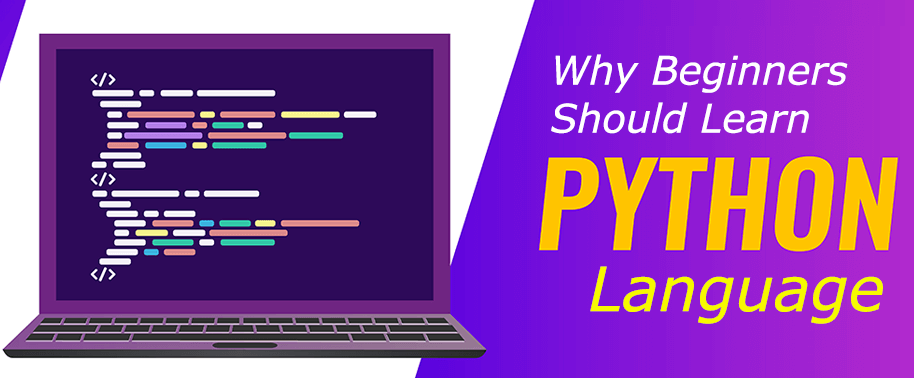Why beginners should learn Python Language
0 8860
Python is a consistent and user-friendly server-side language, has been developed by "Guido Van Rossum". It is a rapidly growing programming language with its vast collection of libraries, modules, frameworks, and file extensions.
This language is implemented across diverse fields, from web development to machine learning. In this blog, we will discuss various applications and benefits of Python language. Through this, one can easily get the solution to one of the biggest questions i.e. "Why you should learn python".

To learn python online, you can refer to multiple tutorials and documentation that are available across the internet. Python acts as a wonderful programming language for developers, software engineers, scientists of scientific computing and even hackers due to its huge versatility, object-oriented concepts, simplicity, and flexibility.
Python is an outstanding language to discover the beginner's need. It is mostly recommended because of its neatly organized and easy to learn syntaxes as compared to other languages like C++, Java, etc.
Python contains multiple programming paradigms due to which companies prefer it.
Let's dig out into some of the important features:
Simple:
Python makes use of simple-to-learn syntaxes which permits programmers to create complex programs in less time. This language requires less coding due to which rapid prototyping can be conceivable.
Dynamic Features:
Python comprises of a large list of libraries and garbage support which permits dynamic features and is capable of doing automatic memory management. The types of the variable can be modified over the execution in Python.
Enhance Productivity:
Python consists of numerous process integration features, control capabilities, and unit test frameworks to increase the application's speed and productivity.
Extensibility:
Python constitutes of standard libraries including internet, operating system interfaces, and web service tools to permit extension. Moreover, Python process markup and XML through its execution on advanced operating systems.
Reduce Maintenance Cost:
Python contains simple code which permits the programmer to reduce the maintenance cost of the programs.
Application of Python:
In spite of some features, how Python has been implemented in diverse domains can be demonstrated through the following applications.
GUI-related Applications:
With the presence of rich text processing paradigms, modular architecture and easy syntaxes in Python, this language has become a great choice for creating desktop-based applications. These applications with rich functional GUI can be developed through GUI toolkits such as PYGtk or wxPython etc.
Web-Development Applications:
The most rapidly used web-frameworks such as TurboGears, flask, Cherrypy, etc. use python language. These frameworks can deliver standard libraries and components which streamline tasks based on interfacing with network protocols (like FTP, SMTP), and content management.
Python is the best option to build scalable applications that are related to the multi-protocol network.
Developing Games:
Python comprises of a wide range of libraries that are compatible with games development.
For example cocos2d, Pygame etc.
Machine Learning:
Python is the best suitable for AI-based projects due to its flexibility, consistency, stability, and availability of AI libraries and frameworks like TensorFlow.
Conclusion:
Python is been implementing in Machine learning, data visualization, data analytics and Artificial Intelligence through its pre-written code in libraries. These extensive ranges of components of python simplify complex programming tasks.
To learn python online with all basics to advanced level topics, the Coding Tag has prepared a Python course.

Share:






Comments
Waiting for your comments